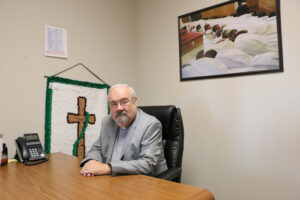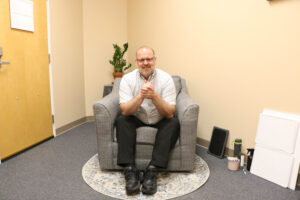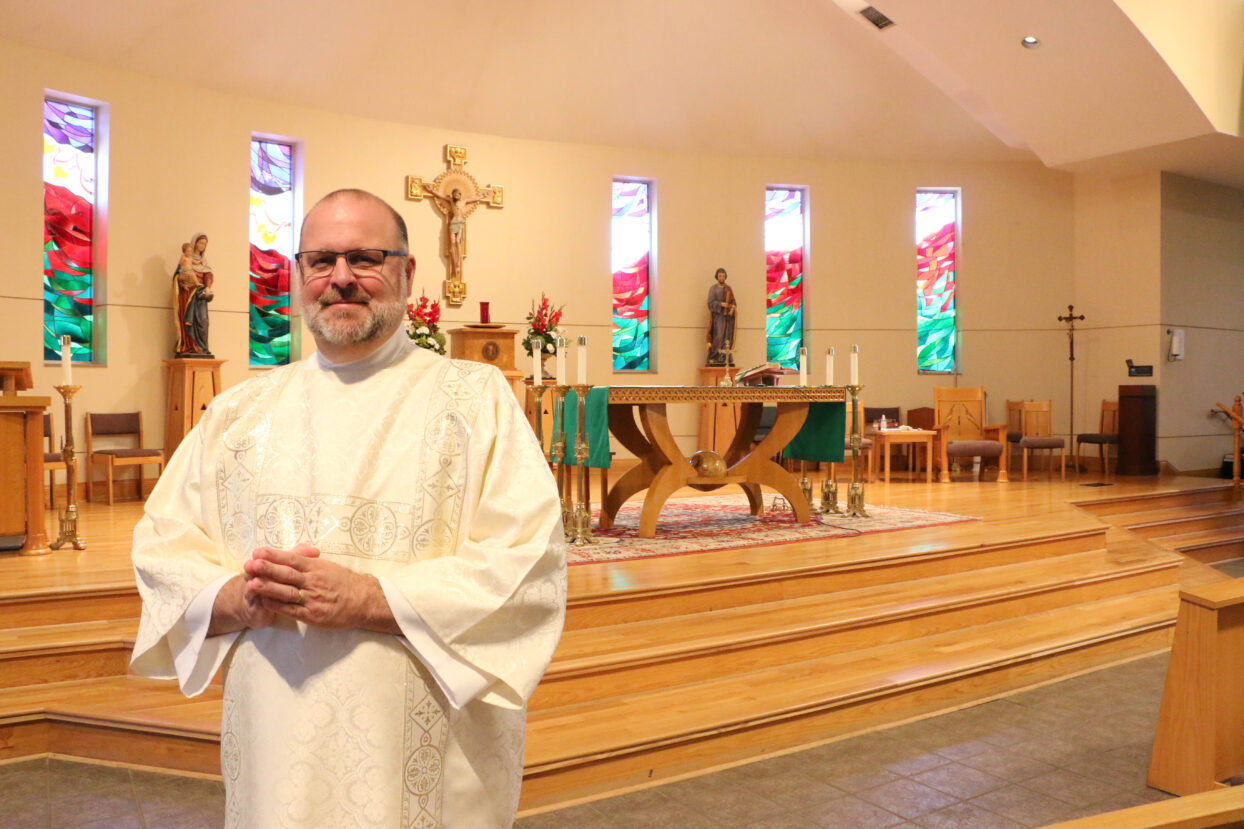Catholic Extension-funded iThirst program begins to have an impact in diocese
By Gabrielle Nolan
Drugs. Alcohol. Sex. Gambling. Addiction comes in many forms, whether it’s substance abuse or behavioral addiction.
Addiction not only affects the addict, but also their family members, friends, and communities.
Providing support for all involved in the sphere of addiction is a program called iThirst, which is an initiative of the Missionary Servants of the Most Holy Trinity. This religious community of priests and brothers focus on serving the poor and abandoned.
According to its website, the iThirst initiative “empowers dioceses, parishes, and communities to become a resource for those suffering from addictions and their families.”
The executive director of iThirst, Keaton Douglas, wrote the book The Road to Hope: Responding to the Crisis of Addiction, which was published by Our Sunday Visitor in 2023.
Ms. Douglas leads Zoom classes online for clergy, religious, and lay people to receive a Spiritual Companionship Certification with Seton Hall University.
Paul Simoneau, vice chancellor of administration for the Diocese of Knoxville, contacted Deacon Tim Elliott, former diocesan director of the diaconate and deacon formation, about utilizing the iThirst program within the diocese.
“The program was funded through a grant offered by the Catholic Extension Society,” Mr. Simoneau said. “When I learned of the initiative that Catholic Extension was offering grants through, I communicated with the diaconate office seeing the obvious value in such training for those of our deacons involved in parish ministry.”
Deacon Elliott said that deacons are “called to a life of service.”

Deacon Tim Elliott, in his office at All Saints Church, has led efforts to utilize the iThirst program within the Diocese of Knoxville as a way to combine mental health and spiritual health in counseling. (Photo Bill Brewer)
“We are servants of the Word, altar, and charity,” he said. “All of these are highlighted in a call to serve those who have fallen into dependencies. Being the hands and feet of Jesus, bringing the needs of the neighborhood to the altar and the Church to the neighborhood, the program seemed natural.”
“Coming out of the pandemic, I knew from experience that there were many still coping with the aftereffects of the isolation and mental-health issues that led to dependencies on drugs and alcohol,” Deacon Elliott continued. “Also, there has been an increase in dependencies that are manifesting in the communities of East Tennessee.”
Deacon Elliott selected deacons for the iThirst initiative based on their predisposition to service with the homeless and local communities in need, such as the poor and underserved, as well as those interested in the areas of recovery and mental health.
“Deacon Robert Rust is a mental-health professional in the Knoxville area and serves the community though counseling and charitable opportunities in St. Vincent de Paul,” Deacon Elliott shared. “Deacon Wade Eckler was similarly chosen in the Chattanooga area. His interests are with the underserved in the Chattanooga area.”
The deacons’ online classes ran from February to April of this year, putting in six hours a week for eight weeks.
By engaging in the iThirst program, participants do the following:
- Study the spiritual dimension of the disease of addiction, including its devastating physiological and psychological effects.
- Learn pastoral-care strategies appropriate for this population and motivational interviewing and listening techniques.
- Receive Spiritual Companion Certification through Seton Hall University in New Jersey along with an official iThirst companion card to promote their service to their community
- Receive 4.8 continuing education units.
- Understand how to effectively work with those suffering from addictions and their families.
- Know how to assist their pastors in establishing a parish recovery ministry.
The program highlights the spiritual dimension to addiction as well as the physical.
“Those elements both need to be addressed in any recovery program,” Deacon Elliott said. “The Catholic Church has a long history of social action and response to societal issues. It is only natural that the Church would come to assist in this need as well. It all has to do with recognition of the dignity of the individual and responding to the person offering that dignity defined by God—to be created in His image. Answering not only the physical needs but also the spiritual guidance and comfort to addiction issues is an important role for the Church.”
Counseling for the mind and for the soul
Deacon Robert Rust serves at All Saints Parish in Knoxville, where he also operates his counseling practice, Bosco Counseling, inside All Saints Church.
He has had previous experience working with the addicted at the homeless shelter at Knox Area Rescue Ministries (KARM).
“The vast majority of people there are either in the midst of addiction or they’re trying to get over an addiction, trying to recover. And so virtually everyone that I worked with there at KARM … the major issue was addiction. So, I had a ton of that; I had like a year-plus of that,” Deacon Rust said.
He described the iThirst program as “very interactive.”
“It was not like we just sat there and had information dumped on us,” Deacon Rust explained. “We got to learn from each other almost as much as we got to learn from the iThirst presenter, Keaton Douglas. … She is super passionate, super passionate about addiction and trying to help. She really wants to see more and more resources available to people who are addicted coming from the Church, she really wants to see a lot more of that. She’s very passionate about helping this particular population.”

Deacon Robert Rust, in his counseling office within All Saints Church in Knoxville, is active in treating people seeking help with addictions. Deacon Rust incorporates the iThirst program as part of his mental-health counseling practice. (Photo Bill Brewer)
Deacon Rust commented that the Catholic angle or lens is not as common in the counseling industry, but the iThirst program was infused with Catholicism.
“So, being able to call on the Holy Spirit for joining these people talking in that moment, being able to call upon saints, asking for their intercession, that’s something that’s just not in the current thinking, if you will, of people who are in the counseling or psychological world. So, having that added to it, I thought, was great. It was a very nice aspect to the iThirst spiritual companionship piece,” he said.
Deacon Rust believes the spiritual component is an essential part when working with someone in addiction recovery.
“I believe if you leave out the spiritual component … it leaves a lot to be desired because if you’re not including the spiritual element, there’s parts of the person that are not being addressed, and then if you don’t address those parts they will still be there after you’ve done the work. And so, the person is going to have a much better chance at recovery when you include the spiritual aspects in the process,” he said.
“Our pain and our suffering can have meaning, and that’s one of the wonderful aspects of the Catholic aspects,” Deacon Rust added.
The iThirst program also shared the importance of talking about addiction with a trusted family member, friend, or counselor.
“I always did agree that people just talking to other people will be a huge help for them when it comes to their addiction issues, just being able to speak what’s going on with them and to be heard and understood is a huge help,” Deacon Rust shared. “Whenever I’m working with people who are dealing with similar issues, I look for people in their lives who they can talk to in general as a way to just kind of help the therapeutic process. And so, to some degree, this program did affirm that this is a really good way for people to heal, is just connecting with someone and being able to share what’s going on inside of them.”
Deacon Rust noted that for many individuals, they wait until hitting rock bottom to ask for help.
“People seem to wait until they essentially have no other option before they get help, like everything has to completely blow up in their life before they get help,” he said. “If people are seeing that things are headed downhill, it would be great if they could seek help before things become completely unmanageable. If things are headed in a bad direction, please start asking for help before you’re forced to do it … while you still have the choice.”
While a stigma may still exist around mental-health issues, Deacon Rust said that he does not see hostility towards those who “need help with addiction.”
“There might be, in their heads, some sort of shame or something like that that they need help with this particular issue, but my perception is that when people actually go to get the help, they don’t have nearly the negativity around them that they anticipated,” Deacon Rust explained.
‘You are dependent on God for everything’
Deacon Eckler serves at Our Lady of Perpetual Help parish in Chattanooga.
After participating in the iThirst program, he now has hopes to begin a group in Chattanooga.
“There’s no iThirst, and if you look at the Alcoholics Anonymous meeting schedule, there are zero meetings in Chattanooga at a Catholic parish,” he said.
“They’re at AA buildings and at other denominations. I would like to start a group, I don’t know where, but I would like to start a Catholic group because I think that it’s needed. It wouldn’t replace Alcoholics Anonymous, that’s not the goal. There’s a group called Catholics in Recovery that has chapters around the country, and they are not present in Chattanooga either. My thought was to get with them and have them help me set something up in Chattanooga so that a Catholic group is available to help. I’ve been to some AA meetings in Chattanooga … there really isn’t much of a spiritual emphasis at all, let alone Catholic. That’s missing. The community is great, I think it’s necessary for people, but I really would like to start a group to give people the opportunity to be part of a group that helps support a sober Catholic lifestyle,” he continued.
Deacon Eckler said he has a better understanding of addiction and “how it affects a person, physically, mentally, spiritually.”
“It gave me a lot of insight into maybe some of the traits and characteristics of a person who is struggling with something more than just the normal work or family responsibilities,” he pointed out.
“Somebody who is struggling with an addiction, it affects how they see themselves, and inevitably it’s going to have an effect on how they see God and how they perceive God sees them,” Deacon Eckler added. “I think that may be the most profound thing, especially from our perspective, coming at it from the spiritual side and being expected to be able to help people with the spiritual struggle that comes with it, and they seem to go hand in hand. That the recovery needs to include—almost a recovery of yourself and your spiritual self. I think that’s one of the reasons why we may know of people in recovery or gone through this process of dealing with an addiction, they will frequently have this reawakening, this kind of renewal of their spiritual life because it’s something that gets suppressed or forgotten, I think when somebody is actively in an addictive lifestyle.”
Before the iThirst classes began, Deacon Eckler read Ms. Douglas’ book on addiction and learned more about her and her passion for helping the addicted.
“One of the things I find interesting about her, it was a divorce that got her into this work,” Deacon Eckler noted. “And at first, I thought, well that’s kind of weird, but after going through the classes and listening to other classmates who probably half of them were either in recovery or had been at some point—I’m convinced that it’s brokenness, it’s a fallenness that we all have to some extent. And for her … her divorce brought it out, and she channeled this into helping other people who were broken as well but needed a special, a different kind of help. While she wasn’t an addict, she has a great deal of compassion for people, and that was my biggest takeaway from her … there’s no judgment from her. She knows that people for any number of reasons can fall and become less than they were meant to be, and she’s willing to help them. I found her very encouraging.”
Deacon Eckler believes that addicts striving for sobriety have something to teach Christians.
“This one guy told me, he said, ‘it helps me to help you.’ He said, ‘it helps me to be sober by helping you to be sober.’ Their attitude towards sobriety, in my mind, is the attitude we should have towards Christianity, toward our faith, toward life in general,” Deacon Eckler shared.
“But we don’t do that, and I think it’s the same thing why typically people who live in this land of plenty tend to forget where their next breath comes from. And we, the addict, knows. The addict that’s in recovery is that person who’s poor in spirit, and they live that way. And I think we would all benefit from reflecting on that more, how dependent we are on each other and God, and to be that person who is willing to spend time with somebody because you could say me helping you be a better man makes me a better man,” he noted.
“You shouldn’t have to hit the bottom of anything to realize that you are dependent on God for everything and to want to share that with other people. I think if we all realized, if we all treated our brokenness and our sin the way addicts treat their addiction, again, the ones who are in recovery, we would have a thriving faith community,” he concluded.



Comments 1
This program is sorely needed in our world. Most of my family have been addicted to alcohol and/or drugs and it is a deeply spiritual problem, which in my opinion, has been neglected for too long. I hope this will be the start of real recovery and healing for the many who are in the throws of the struggle with the demons of addiction. God bless all who are engaged with this endeavor, and may St. Michael join you in the battle.